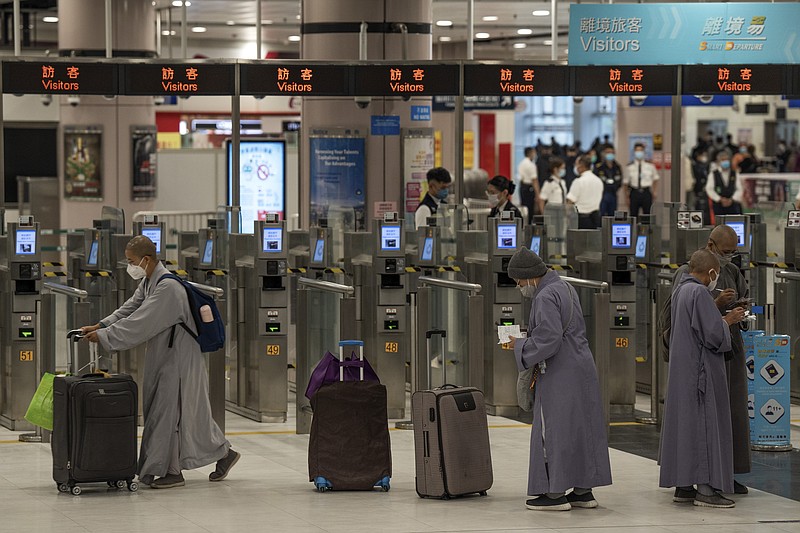BEIJING -- After years of separation from his wife in mainland China, Hong Kong resident Cheung Seng-bun made sure to be among the first in line after the reopening Sunday of border crossing points.
The ability of residents of the semi-autonomous southern Chinese city to cross over is one of the most visible signs of China's easing of border restrictions imposed almost three years ago, with travelers arriving from abroad no longer required to undergo expensive and time-consuming quarantines.
That comes even as the virus continues to spread in China amid what critics say is a lack of transparency from Beijing.
"I'm hurrying to get back to her," Cheung, lugging a heavy suitcase, told The Associated Press as he prepared to cross at Lok Ma Chau station, which was steadily filling with eager travelers.
Those crossing between Hong Kong and mainland China, however, are still required to show a negative covid-19 test taken within the past 48 hours -- a measure China has protested when imposed by other countries.
Hong Kong has been hit hard by the virus, and its land and sea border checkpoints with the mainland have been largely closed for almost three years. Despite the risk of new infections, the reopening that will allow tens of thousands of people who have made previous online bookings to cross each day is expected to provide a much-needed boost to Hong Kong's tourism and retail sectors.
On a visit to the station Sunday morning, Hong Kong's Chief Executive John Lee said the sides would continue to expand the number of crossing points from the current seven to the full 14.
"The goal is to get back as quickly as possible to the pre-epidemic normal life," Lee told reporters. "We want to get cooperation between the two sides back on track."
Communist Party newspaper Global Times quoted Tan Luming, a port official in Shenzhen on the border with Hong Kong, saying about 200 passengers were expected to take the ferry to Hong Kong, while another 700 were scheduled to travel in the other direction on the first day of reopening. Tan said a steady increase in passenger numbers is expected over coming days.
Hong Kong media reports said about 300,000 travel bookings from the city to mainland China have already been made, with a daily quota of 60,000.
Limited ferry service also was restored from China's Fujian province to the Taiwanese-controlled island of Kinmen just off the Chinese coast.
The border crossing with Russia at Suifenhe in the far-northern province of Heilongjiang also resumed normal operations, just in time for the opening of the ice festival in the capital of Harbin, a major tourism draw.
And at Ruili, on the border with Burma, normal operations were resumed after 1,012 days of full or partial closure in response to repeated outbreaks blamed partly on visitors from China's neighbor.
Burma is often called Myanmar, a name that ruling military authorities adopted in 1989. Opposition leader Aung San Suu Kyi and other regime opponents have refused to adopt the name change, as have the U.S. and Britain.
So far, only a fraction of the previous number of international flights are arriving at major Chinese airports.
Beijing's main Capital International Airport was expecting eight flights from overseas on Sunday. Shanghai, China's largest city, received its first international flight under the new policy at 6:30 a.m. with only a trickle of others to follow.
Since March 2020, all international passenger flights bound for Beijing have been diverted to designated first points of entry into China. Passengers were required to quarantine up to three weeks.
Shanghai announced it would again start issuing regular passports to Chinese for foreign travel and family visits, as well as renewing and extending visas for foreigners. Those restrictions have had a particularly devastating effect on foreign businesspeople and students in the key Asian financial center.
China is now facing a surge in cases and hospitalizations in major cities and is bracing for a further spread into less-developed areas with the start of its most important holiday, the Lunar New Year, in coming days.
TRAVEL CONCERNS
Meanwhile, more foreign governments are imposing testing requirements on travelers from China -- most recently Germany, Sweden and Portugal. On Saturday, German Foreign Minister Annalena Baerbock urged citizens to avoid "unnecessary" travel to China, noting the rise in coronavirus cases and China's "overburdened" health system.
Thailand, bracing for a wave of Chinese tourists, will also reintroduce entry requirements for foreigners arriving by airplane.
The response comes as China tackles a surge in virus cases triggered by the dismantling of its strict zero-covid restrictions in recent weeks. At the same time, the emergence of a highly transmissible variant -- already on track to become the dominant strain in the U.S. -- is fanning concerns over new mutations.
So far there haven't been significant differences in severity identified between cases caused by the new XBB.1.5 and those from other variants. The World Health Organization is planning an updated assessment on its risks in the coming days.
China has yet to report any domestic cases of the variant that's been found in at least 28 other nations. South Africa was among the latest to join the list.
In Europe, countries including Belgium, Sweden and the U.K. have announced new requirements on travelers from China. The European Union on Wednesday "strongly encouraged" members to adopt pre-departure covid testing, recommended masking on flights and urged wastewater checks.
Portugal's testing requirement will take effect from Sunday. In addition, passengers and crew traveling to and from China must use a face mask during the flight, and Lisbon's airport will undertake wastewater monitoring to identify the virus and carry out genomic sequencing.
In Thailand, adults must show proof of at least two vaccinations or recovery from the virus since July from today. India introduced mandatory covid-19 tests this month for flyers from China, Hong Kong, Japan, South Korea, Singapore and Thailand.
The German regulation also allows for spot checks on arrival. Germany, like other European nations, will test wastewater from aircrafts for possible new virus variants. The measures come into force at midnight today and are scheduled to last until April 7.
Chinese health authorities publish a daily count of new infections, severe cases and fatalities, but those numbers include only officially confirmed cases and use a very narrow definition of covid-19-related deaths.
On Sunday, the National Health Commission reported 7,072 new confirmed cases of local transmission and two new deaths -- even as individual provinces were reporting as many as 1 million cases per day.
Authorities say that since the government ended compulsory testing and permitted people with mild symptoms to test themselves and convalesce at home, it can no longer provide a full picture of the outbreak. China's vulnerabilities are increased by the population's general lack of exposure to the virus and a relatively low vaccination rate among the elderly.
Government spokespeople insist the situation is under control and reject accusations from the World Health Organization and others that they're not being transparent about the outbreak that could lead to the emergence of new variants.
Criticism has largely focused on heavy-handed enforcement of regulations, including open-ended travel restrictions that saw people confined to their homes for weeks, sometimes sealed inside without adequate food or medical care.
Anger was also vented over the requirement that anyone who potentially tested positive or had been in contact with such a person be confined for observation in a field hospital, where overcrowding, poor food and hygiene were commonly cited.
Information for this article was contributed by Alice Fung, Karmen Li, Frank Jordans, Olivia Zhang, Wayne Zhang, Henry Hou and staff writers of The Associated Press and by Libby Cherry of Bloomberg News.
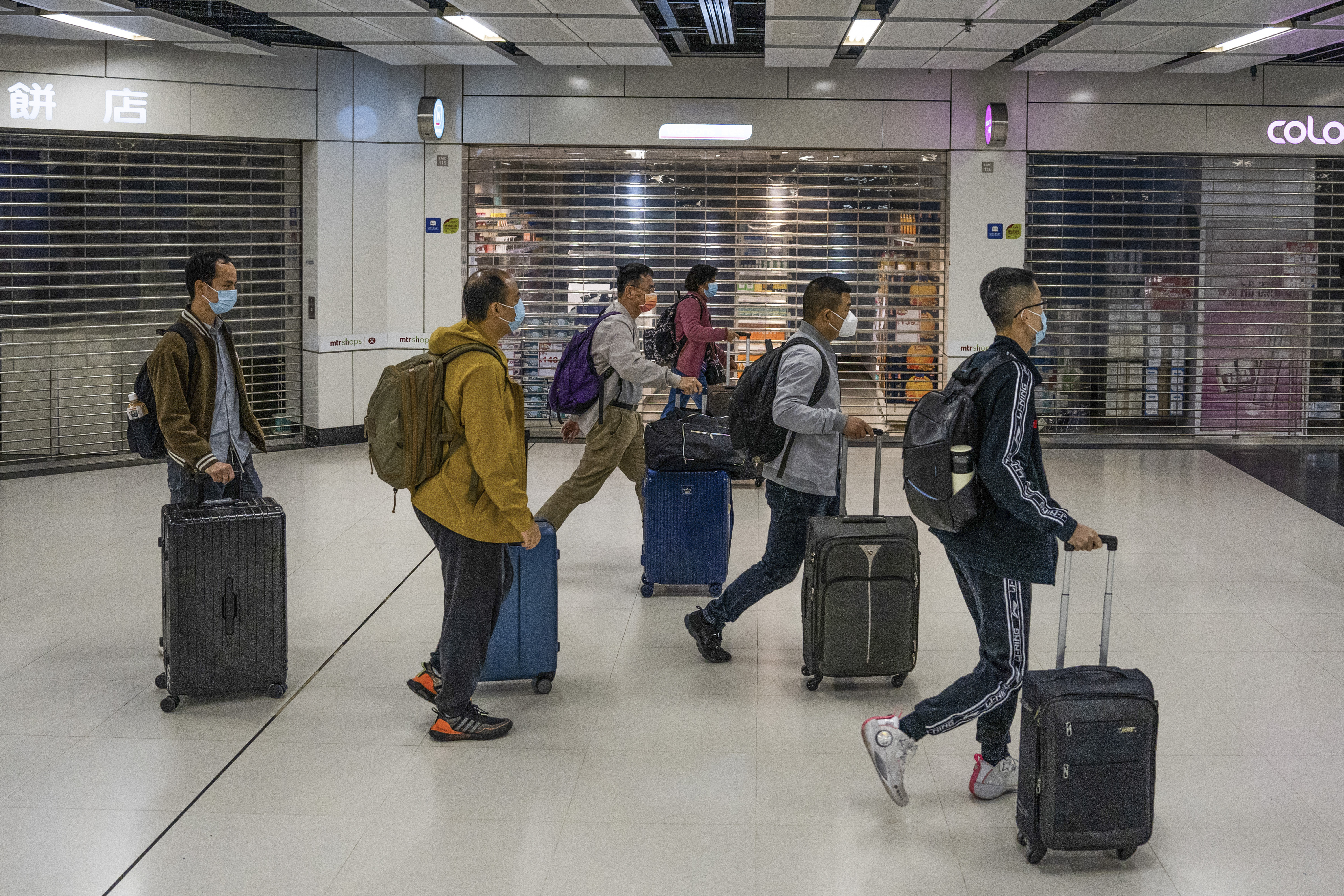 Travelers wearing face masks with their luggage head to the immigration counter at the departure hall at Lok Ma Chau station following the reopening of crossing border with mainland China, in Hong Kong, Sunday, Jan. 8, 2023. Travelers crossing between Hong Kong and mainland China, however, are still required to show a negative COVID-19 test taken within the last 48 hours, a measure China has protested when imposed by other countries. (AP Photo/Bertha Wang)
Travelers wearing face masks with their luggage head to the immigration counter at the departure hall at Lok Ma Chau station following the reopening of crossing border with mainland China, in Hong Kong, Sunday, Jan. 8, 2023. Travelers crossing between Hong Kong and mainland China, however, are still required to show a negative COVID-19 test taken within the last 48 hours, a measure China has protested when imposed by other countries. (AP Photo/Bertha Wang)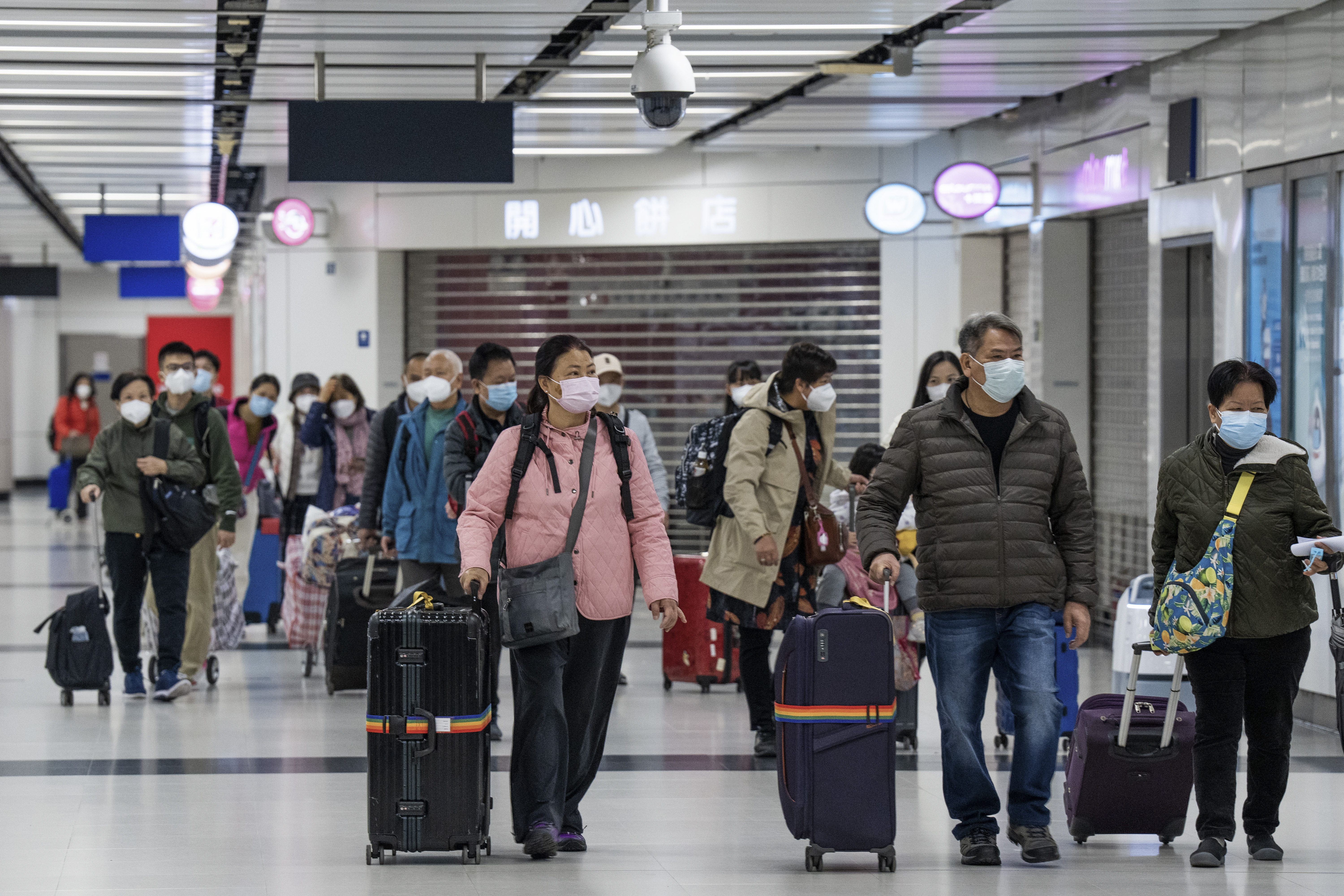 Travelers wearing face masks with their luggage head to the immigration counter at the departure hall at Lok Ma Chau station following the reopening of crossing border with mainland China, in Hong Kong, Sunday, Jan. 8, 2023. Travelers crossing between Hong Kong and mainland China, however, are still required to show a negative COVID-19 test taken within the last 48 hours, a measure China has protested when imposed by other countries. (AP Photo/Bertha Wang)
Travelers wearing face masks with their luggage head to the immigration counter at the departure hall at Lok Ma Chau station following the reopening of crossing border with mainland China, in Hong Kong, Sunday, Jan. 8, 2023. Travelers crossing between Hong Kong and mainland China, however, are still required to show a negative COVID-19 test taken within the last 48 hours, a measure China has protested when imposed by other countries. (AP Photo/Bertha Wang)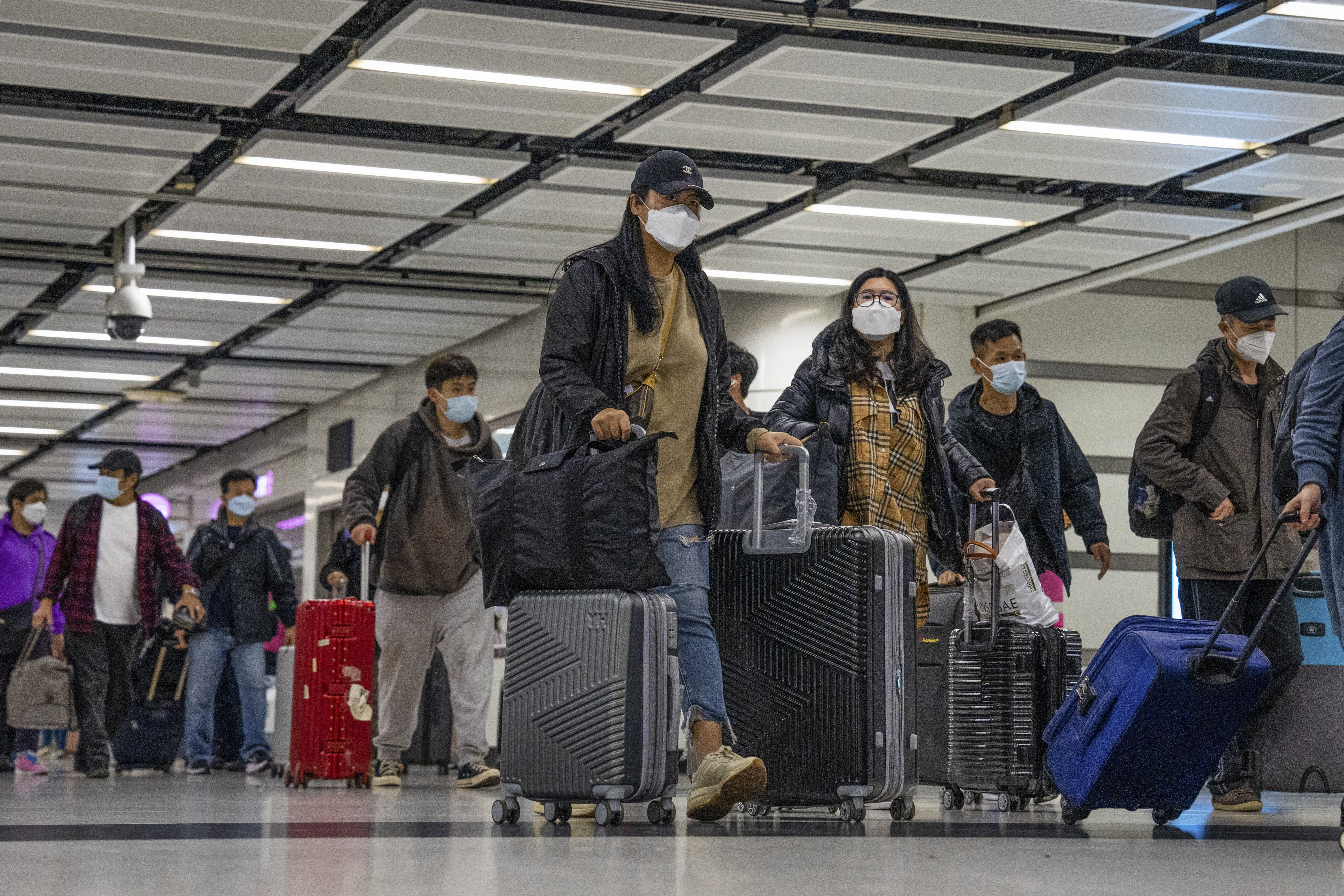 Travelers wearing face masks with their luggage head to the immigration counter at the departure hall at Lok Ma Chau station following the reopening of crossing border with mainland China, in Hong Kong, Sunday, Jan. 8, 2023. Travelers crossing between Hong Kong and mainland China, however, are still required to show a negative COVID-19 test taken within the last 48 hours, a measure China has protested when imposed by other countries. (AP Photo/Bertha Wang)
Travelers wearing face masks with their luggage head to the immigration counter at the departure hall at Lok Ma Chau station following the reopening of crossing border with mainland China, in Hong Kong, Sunday, Jan. 8, 2023. Travelers crossing between Hong Kong and mainland China, however, are still required to show a negative COVID-19 test taken within the last 48 hours, a measure China has protested when imposed by other countries. (AP Photo/Bertha Wang)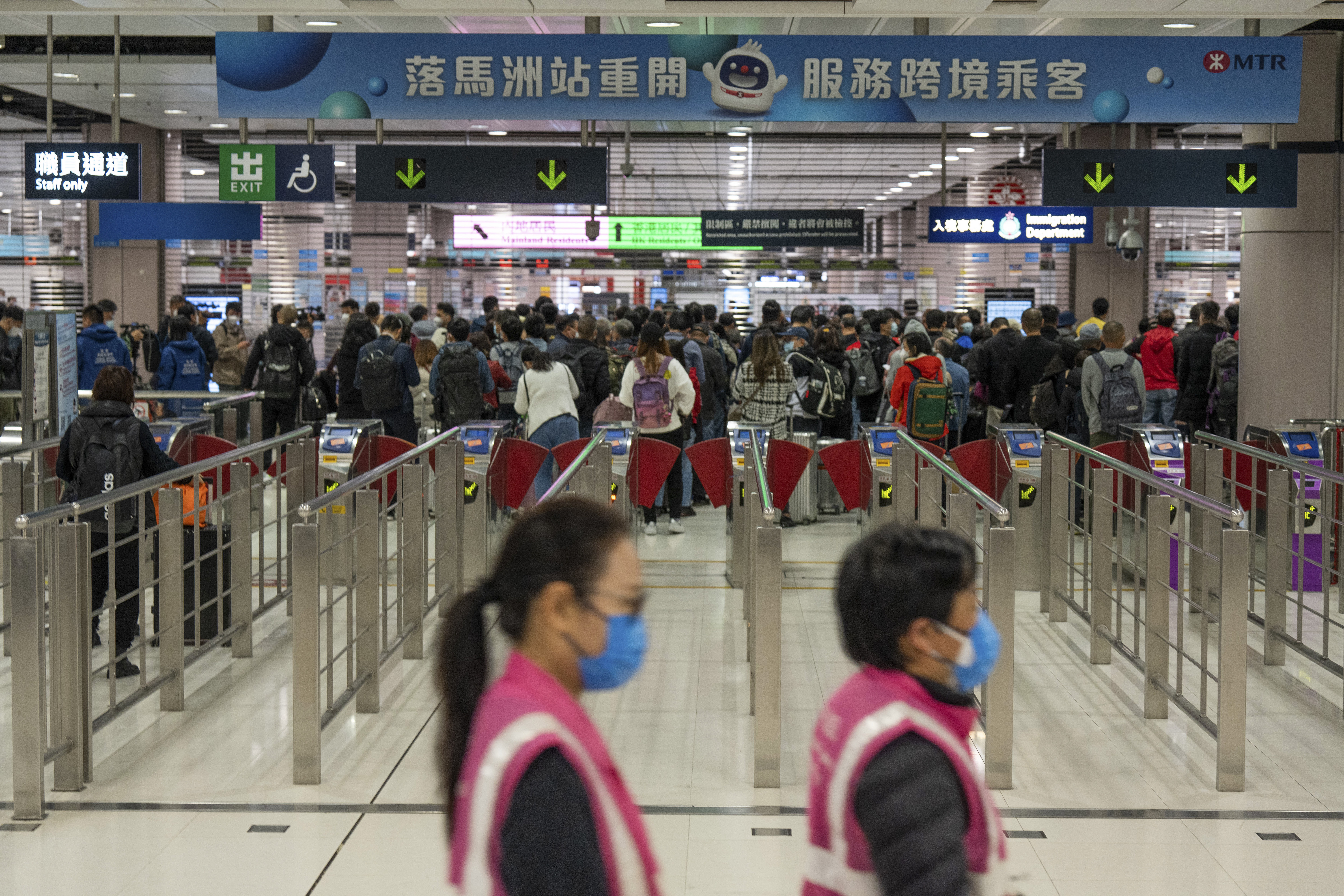 Workers wearing face masks walk by as travelers wait at the departure hall of the Lok Ma Chau station following the reopening of crossing border with mainland China, in Hong Kong, Sunday, Jan. 8, 2023. Travelers crossing between Hong Kong and mainland China, however, are still required to show a negative COVID-19 test taken within the last 48 hours, a measure China has protested when imposed by other countries. (AP Photo/Bertha Wang)
Workers wearing face masks walk by as travelers wait at the departure hall of the Lok Ma Chau station following the reopening of crossing border with mainland China, in Hong Kong, Sunday, Jan. 8, 2023. Travelers crossing between Hong Kong and mainland China, however, are still required to show a negative COVID-19 test taken within the last 48 hours, a measure China has protested when imposed by other countries. (AP Photo/Bertha Wang)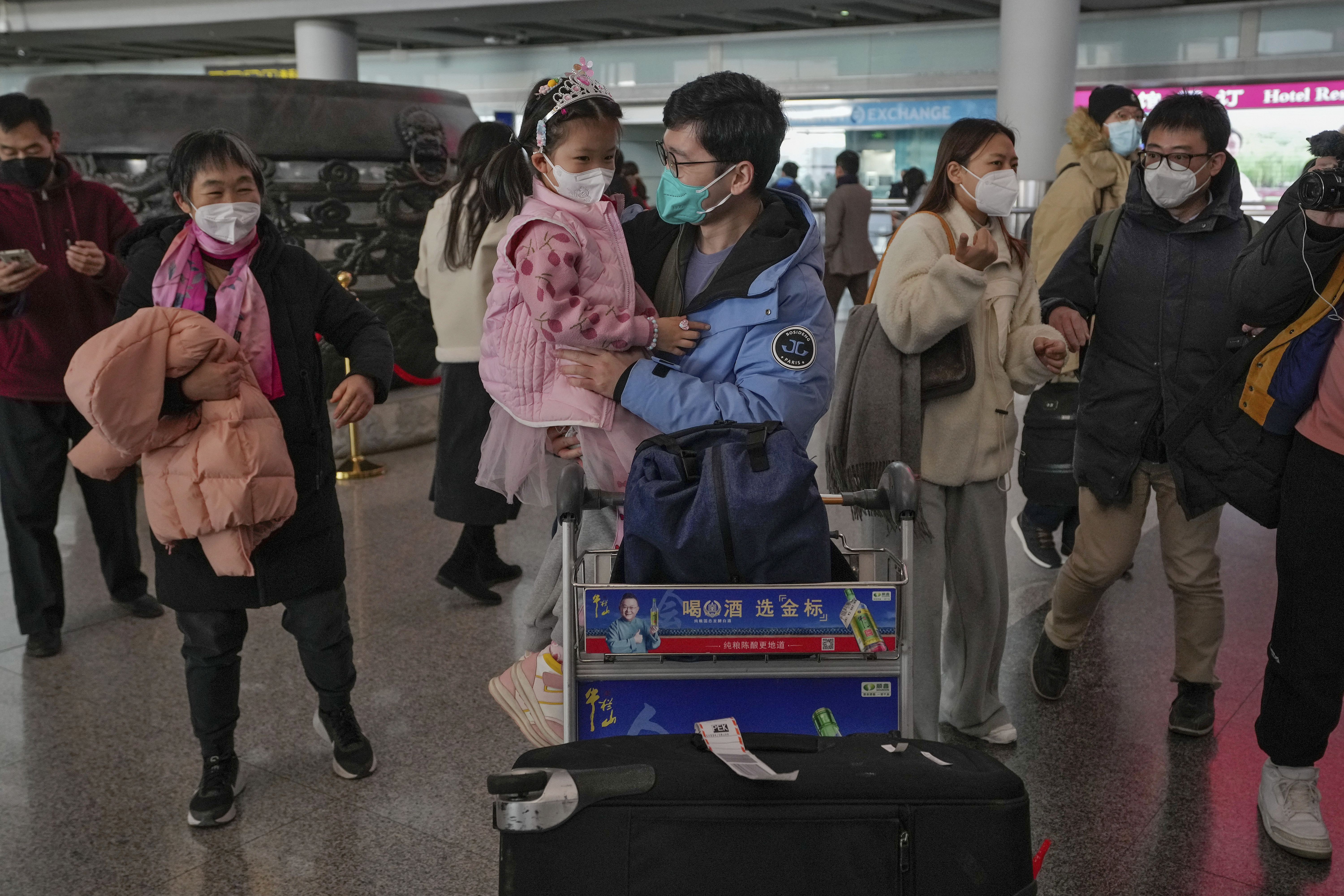 A man wearing a face mask meets with his child as he arrives from Hong Kong at Terminal 3 international arrival hall of the Beijing Capital International Airport in Beijing, Sunday, Jan. 8, 2023. Travelers crossing between Hong Kong and mainland China, however, are still required to show a negative COVID-19 test taken within the last 48 hours, a measure China has protested when imposed by other countries. (AP Photo/Andy Wong)
A man wearing a face mask meets with his child as he arrives from Hong Kong at Terminal 3 international arrival hall of the Beijing Capital International Airport in Beijing, Sunday, Jan. 8, 2023. Travelers crossing between Hong Kong and mainland China, however, are still required to show a negative COVID-19 test taken within the last 48 hours, a measure China has protested when imposed by other countries. (AP Photo/Andy Wong)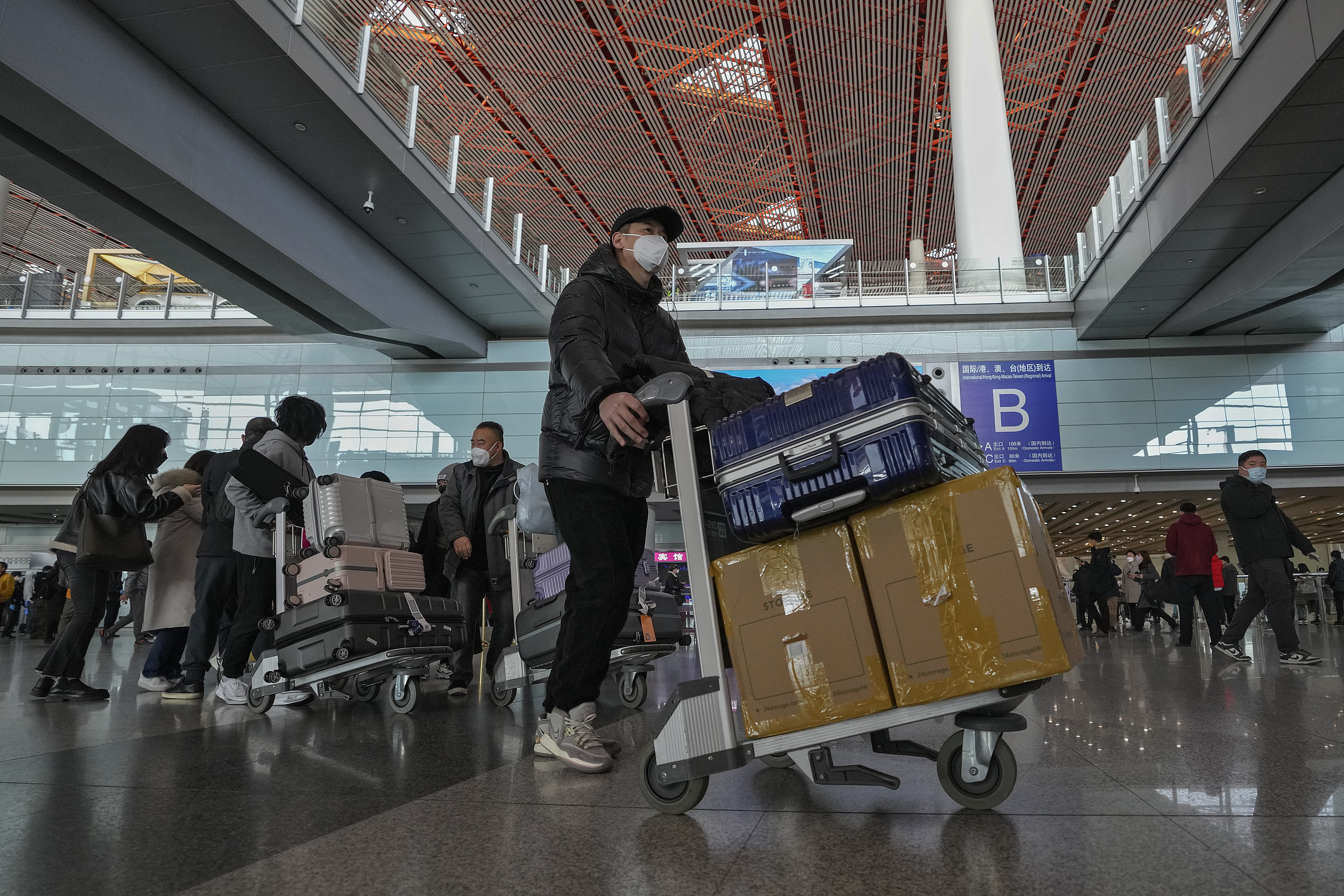 Passengers from Hong Kong arrive at Terminal 3 international arrival hall of the Beijing Capital International Airport in Beijing, Sunday, Jan. 8, 2023. Travelers crossing between Hong Kong and mainland China, however, are still required to show a negative COVID-19 test taken within the last 48 hours, a measure China has protested when imposed by other countries. (AP Photo/Andy Wong)
Passengers from Hong Kong arrive at Terminal 3 international arrival hall of the Beijing Capital International Airport in Beijing, Sunday, Jan. 8, 2023. Travelers crossing between Hong Kong and mainland China, however, are still required to show a negative COVID-19 test taken within the last 48 hours, a measure China has protested when imposed by other countries. (AP Photo/Andy Wong)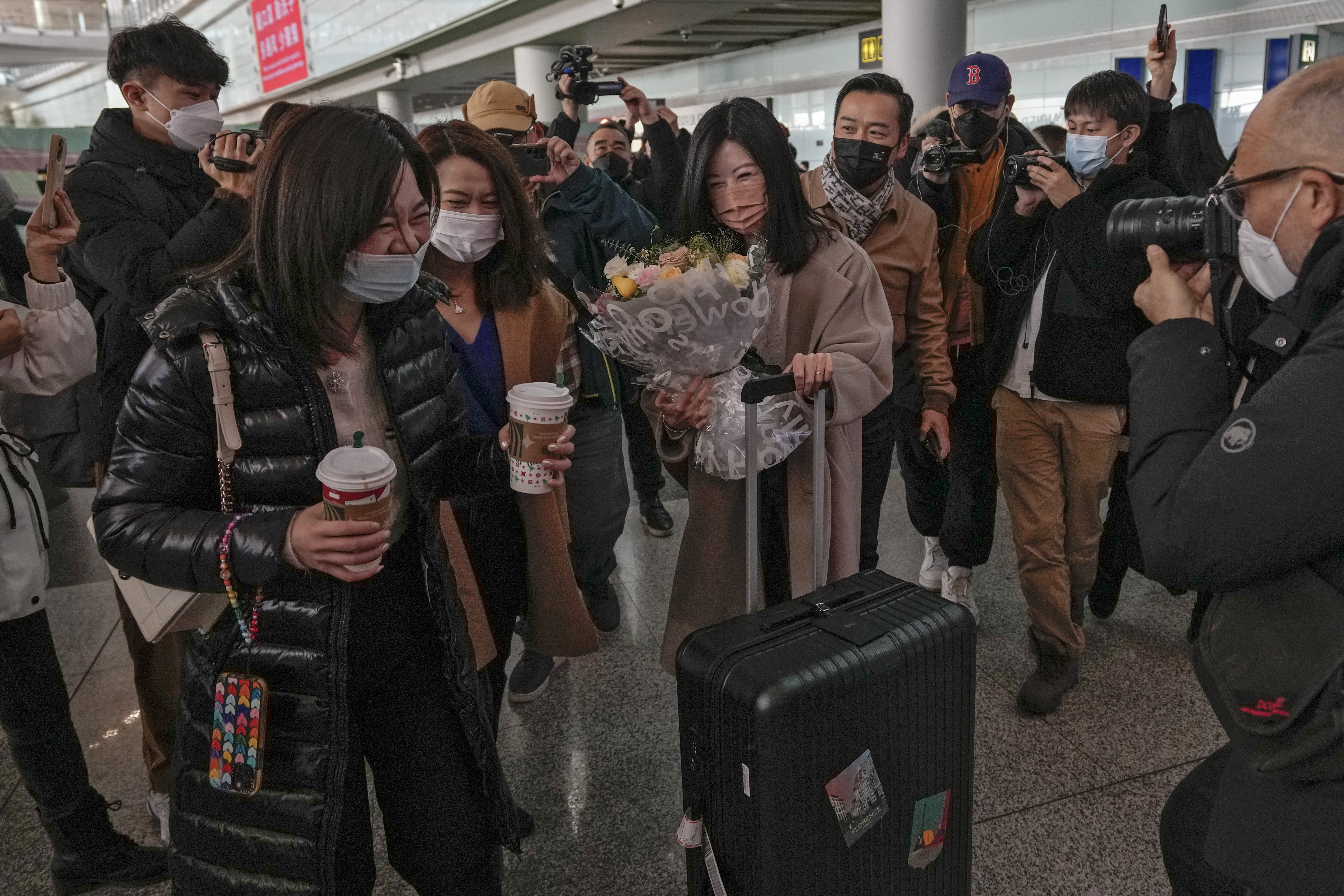 A woman holding a bouquet of flowers reacts with her relatives surrounded by journalists as she arrives from Hong Kong, at Terminal 3 international arrival hall of the Beijing Capital International Airport in Beijing, Sunday, Jan. 8, 2023. Travelers crossing between Hong Kong and mainland China, however, are still required to show a negative COVID-19 test taken within the last 48 hours, a measure China has protested when imposed by other countries. (AP Photo/Andy Wong)
A woman holding a bouquet of flowers reacts with her relatives surrounded by journalists as she arrives from Hong Kong, at Terminal 3 international arrival hall of the Beijing Capital International Airport in Beijing, Sunday, Jan. 8, 2023. Travelers crossing between Hong Kong and mainland China, however, are still required to show a negative COVID-19 test taken within the last 48 hours, a measure China has protested when imposed by other countries. (AP Photo/Andy Wong)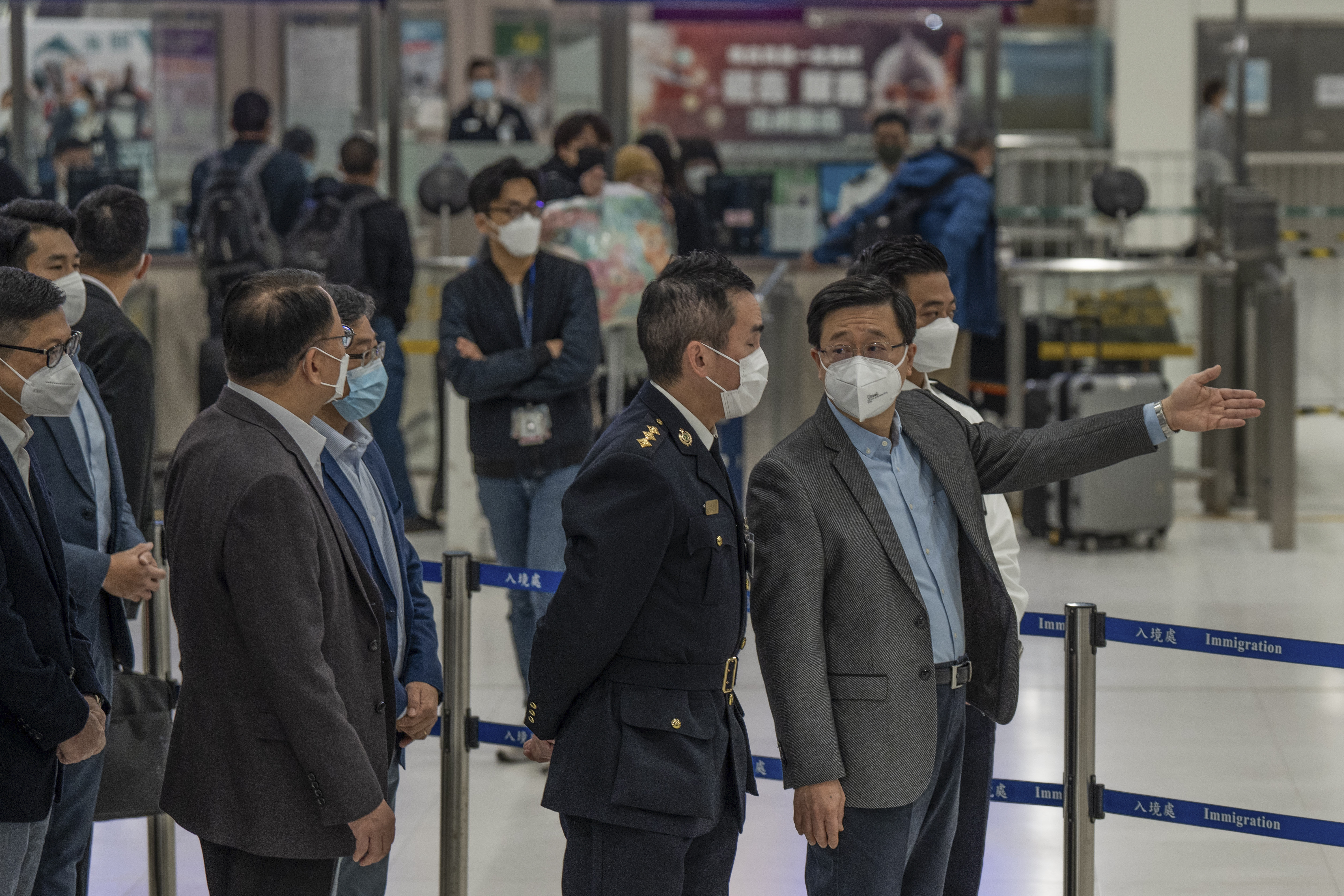 Hong Kong Chief Executive John Lee, right, speaks to an officer as he inspects Lok Ma Chau station following the reopening of crossing border with mainland China, in Hong Kong, Sunday, Jan. 8, 2023. Travelers crossing between Hong Kong and mainland China, however, are still required to show a negative COVID-19 test taken within the last 48 hours, a measure China has protested when imposed by other countries. (AP Photo/Bertha Wang)
Hong Kong Chief Executive John Lee, right, speaks to an officer as he inspects Lok Ma Chau station following the reopening of crossing border with mainland China, in Hong Kong, Sunday, Jan. 8, 2023. Travelers crossing between Hong Kong and mainland China, however, are still required to show a negative COVID-19 test taken within the last 48 hours, a measure China has protested when imposed by other countries. (AP Photo/Bertha Wang)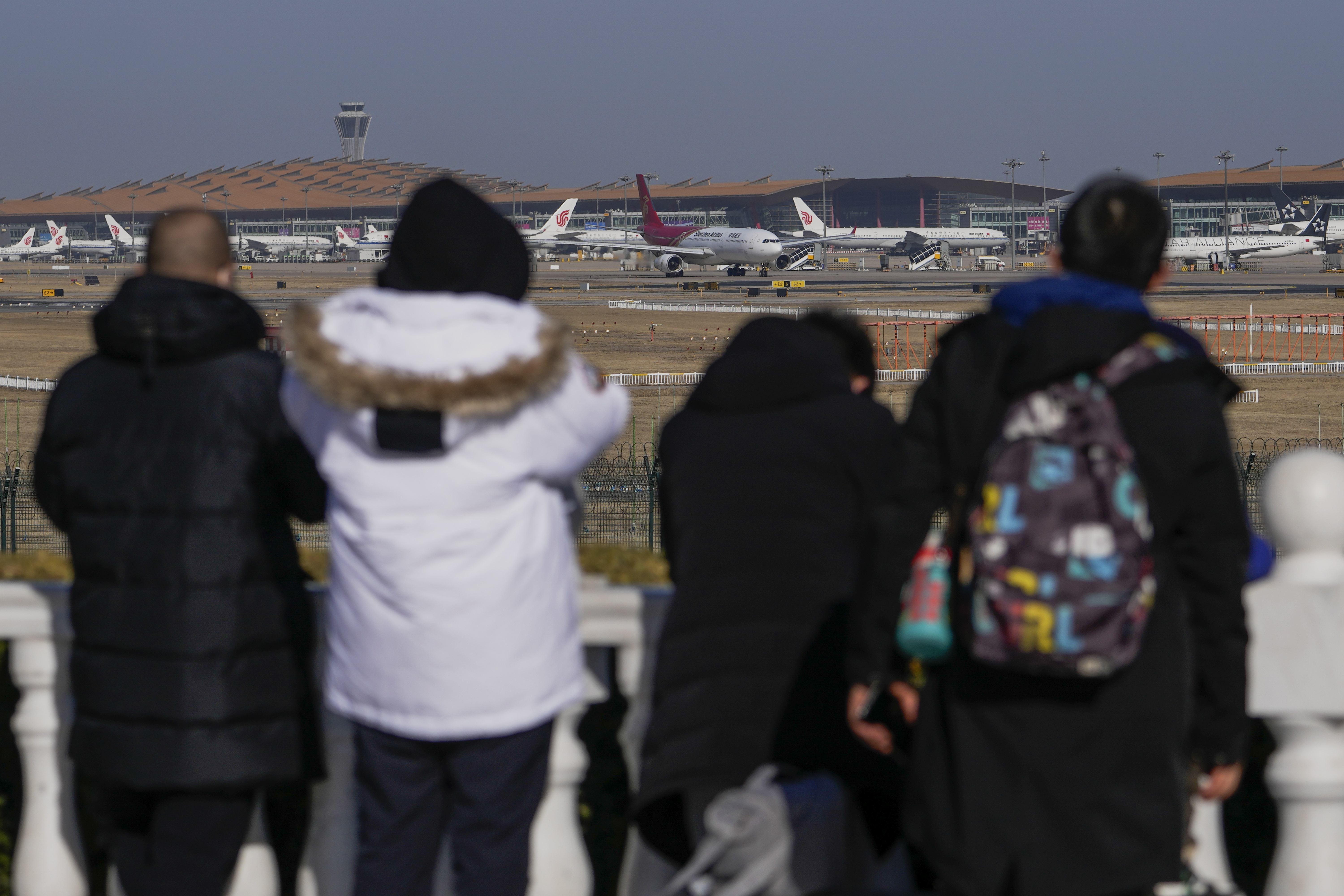 Residents watch airliners taxing at Beijing Capital International Airport in Beijing, Sunday, Jan. 8, 2023. Travelers crossing between Hong Kong and mainland China, however, are still required to show a negative COVID-19 test taken within the last 48 hours, a measure China has protested when imposed by other countries. (AP Photo/Andy Wong)
Residents watch airliners taxing at Beijing Capital International Airport in Beijing, Sunday, Jan. 8, 2023. Travelers crossing between Hong Kong and mainland China, however, are still required to show a negative COVID-19 test taken within the last 48 hours, a measure China has protested when imposed by other countries. (AP Photo/Andy Wong)